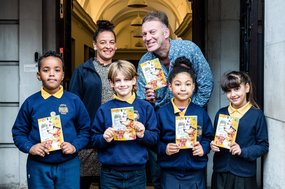
Get Islington Reading was a three-year campaign to develop a community of happy, confident young readers aged 9 to 14 across the London Borough of Islington.
The campaign was funded by the Charity of Sir Richard Whittington through The Mercers’ Company and delivered by the National Literacy Trust and The Reading Agency in collaboration with Islington Council
Library Service and Islington School Improvement Service. This report outlines the activity undertaken and the extent to which the campaign achieved its core outcomes.
Key findings
Get Islington Reading was successful in achieving its key outcomes. For example:
- More children and young people enjoy reading
- A series of surveys of children taking part in Get Islington Reading showed that the programme successfully encouraged more children to enjoy reading, with 1 in 3 (31%) reluctant readers starting to enjoy it as part of the programme.
- Evaluations of specific projects that make up Get Islington Reading also support an increase in reading enjoyment in children in Islington over time. For example, as part the School of Rhyme initiative, reading enjoyment increased by 12 percentage points, from 72% saying they ‘like’ or ‘love’ reading at the start compared with 84% by the end.
- We also see that reading enjoyment is supported during transition from primary to secondary school, as there is a steady year-on-year increase in enjoyment for those in Year 7 in Islington. This is in contrast to the downward trajectory for those in Year 7 nationally.
- More children and young people engage in positive reading behaviours
- For example, we recorded increases in children reading more frequently, reading more widely and using the school and public library more often.
- Surveys of children taking part in Get Islington Reading showed that the programme also successfully encouraged more children to read more frequently, with 1 in 4 (24%) of those who indicated not reading daily doing so over the course of the programme.
- Evaluation findings from The Reading Adventure Game similarly demonstrated an increase in the number of pupils who reported reading more frequently.
- Surveys of children also showed that more were using their school and local library: almost 2 in 3 (65%) of those who didn’t use the school library one year had started to do so a year later and more than 1 in 4 (28%) of those who didn’t use their local library first indicated they were doing so a year later.
- More children and young people think positively about reading
- Exploring children and young people’s reasons for reading shows that the percentage that cite reading as beneficial for the future, for example, more than tripled between 2020 and 2022 (increasing from 7% to 24%).
- More children and young people feel confident about reading
- Survey data of children taking part in Get Islington Reading shows that more than 2 in 5 (45%) of those who initially didn’t see themselves as good readers had started to do so a year later.
- At the project strand level, The Reading Agency’s evaluation findings show that 69% of children taking part in the Summer Reading Challenge reported feeling more confident about their reading.
- More children and young people read for empowerment (i.e. children show increased self-confidence, mental wellbeing, resilience and social connections)
- The various creative reading and writing initiatives offered children opportunities connect with their peers and families and develop their develop wider social and emotional skills through literacy. For example, the number of students reading or sharing stories with friends and families increased across the Andrea Levy project and more than 3 in 4 (77%) children taking part in the School of Rhyme said they were more likely to try again if they have a setback after taking part.
- The survey findings show that 1 in 5 (21%) of children and young people who didn’t feel reading makes them feel better in 2021 had discovered reading as a way to contribute to their feeling of wellbeing a year later.
The positive pupil findings are underpinned by changes for teachers, schools and the community.
- For example, many teachers reported that they have benefited from the project in terms of their own practice and that they have observed positive changes in their school as a result of the project.
- The cross-borough activity and collaboration ensured children felt connected to a wider network of role models outside of schools and across the local community.
An integrated cross-authority way of working (linking schools, libraries and cultural organisations) facilitated powerful knowledge-sharing between partners.
- Partners also highlighted the value of working collaboratively for opening up capacity, providing advocacy as well as enabling relationships, leading to longer-term partnership between education services and the community.
The funding that underpinned the project often acted as a catalyst for schools and community organisations to fulfil plans, activate projects and kick-start long-term reading for pleasure programmes.
- The project will have a genuine legacy, both in Islington itself and as a potentially scalable way of working that could be replicated elsewhere.
- It has proven the value of a place-based model of working, which both partners are adopting into future project planning, as well as the merit of using ‘interest pathways’ to engage children with reading, especially at transition age.
- The project will have ripples that should be felt further afield (ideally at national level) over the next few years, creating a powerful new approach in the rich landscape of reading for pleasure practice and reading communities.
A central focus of the project was supporting children’s reading as they navigate the challenging transition from primary to secondary education. One core element consisted of a toolkit of reading and writing activities, developed with author Sita Brahmachari and based on her book, When Secrets Set Sail. The toolkit has now been adapted into the Anchors and Sails transition resource, available to National Literacy Trust premium members.